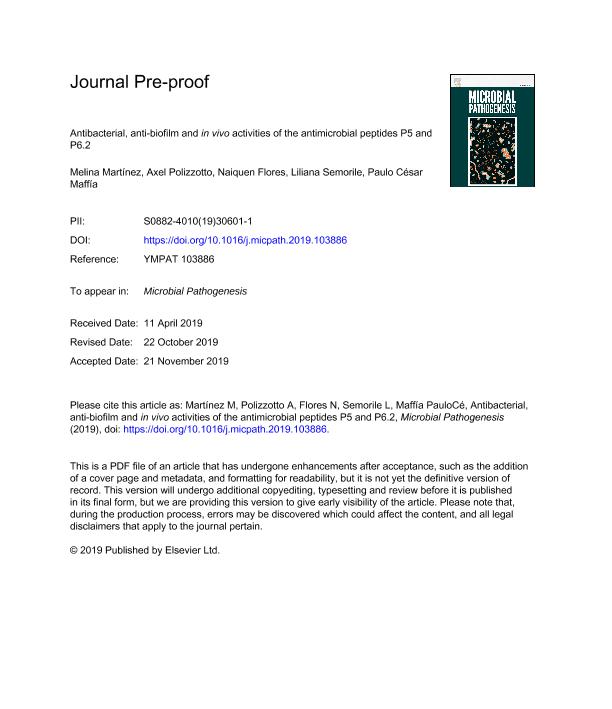Mostrar el registro sencillo del ítem
dc.contributor.author
Martínez, Melina
dc.contributor.author
Polizzotto, Axel Leonel

dc.contributor.author
Flores, Naiquen Elizabeth

dc.contributor.author
Semorile, Liliana Carmen

dc.contributor.author
Maffia, Paulo Cesar

dc.date.available
2022-06-08T13:15:37Z
dc.date.issued
2020-02
dc.identifier.citation
Martínez, Melina; Polizzotto, Axel Leonel; Flores, Naiquen Elizabeth; Semorile, Liliana Carmen; Maffia, Paulo Cesar; Antibacterial, anti-biofilm and in vivo activities of the antimicrobial peptides P5 and P6.2; Elsevier; Microbial Pathogenesis; 139; 2-2020; 1-34
dc.identifier.issn
0882-4010
dc.identifier.uri
http://hdl.handle.net/11336/159213
dc.description.abstract
Cationic antimicrobial peptides (AMPs) are short linear amino acid sequences, which display antimicrobial activity against a wide range of bacterial species. They are promising novel antimicrobials since they have shown bactericidal effects against multiresistant bacteria. Their amphiphilic structure with hydrophobic and cationic regions drives their interaction with anionic bacterial cytoplasmic membranes, which leads to their disruption. In this work two synthetic designed AMPs, P5 and P6.2, which have been previously analyzed in their ability to interact with bacterial or eukaryotic membranes, were evaluated in their anti-biofilm and in vivo antibacterial activity. In a first step, a time-kill kinetic assay against P. aeruginosa and S. aureus and a curve for hemolytic activity were performed in order to determine the killing rate and the possible undesirable toxic effect, respectively, for both peptides. The biofilm inhibitory activity was quantified at sub MIC concentrations of the peptides and the results showed that P5 displayed antibiofilm activity on both strains while P6.2 only on S. aureus. Scanning electron microscopy (SEM) of bacteria treated with peptides at their MIC revealed protruding blisters on Gam-negative P. aeruginosa strain, but almost no visible surface alteration on Gram-positive S. aureus. These micrographs highlighted different manifestations of the membrane-disrupting activity that these kinds of peptides possess. Finally, both peptides were analyzed in vivo, in the lungs of neutropenic mice previously instilled with P. aeruginosa. Mice lungs were surgically extracted and bacteria and pro-inflammatory cytokines (IL-β, IL-6 and TNF-α) were quantified by colony forming units and ELISA, respectively. Results showed that instillation of the peptides produced a significant decrease in the number of living bacteria in the lungs, concomitant with a decrease in pro-inflammatory cytokines. Overall, the results presented here suggest that these two new peptides could be good candidates for future drug development for anti-biofilm and anti-infective therapy.
dc.format
application/pdf
dc.language.iso
eng
dc.publisher
Elsevier

dc.rights
info:eu-repo/semantics/openAccess
dc.rights.uri
https://creativecommons.org/licenses/by-nc-nd/2.5/ar/
dc.subject
ANTI-BIOFILM
dc.subject
ANTI-INFLAMMATORY
dc.subject
LUNG INFECTION
dc.subject
PSEUDOMONAS AERUGINOSA
dc.subject
ANTIMICROBIAL PEPTIDES
dc.subject.classification
Biología Celular, Microbiología

dc.subject.classification
Ciencias Biológicas

dc.subject.classification
CIENCIAS NATURALES Y EXACTAS

dc.title
Antibacterial, anti-biofilm and in vivo activities of the antimicrobial peptides P5 and P6.2
dc.type
info:eu-repo/semantics/article
dc.type
info:ar-repo/semantics/artículo
dc.type
info:eu-repo/semantics/publishedVersion
dc.date.updated
2022-06-06T16:02:12Z
dc.journal.volume
139
dc.journal.pagination
1-34
dc.journal.pais
Países Bajos

dc.journal.ciudad
Amsterdam
dc.description.fil
Fil: Martínez, Melina. Universidad Nacional de Quilmes. Departamento de Ciencia y Tecnología. Laboratorio de Microbiología Molecular; Argentina
dc.description.fil
Fil: Polizzotto, Axel Leonel. Universidad Nacional de Quilmes. Departamento de Ciencia y Tecnología. Laboratorio de Microbiología Molecular; Argentina
dc.description.fil
Fil: Flores, Naiquen Elizabeth. Universidad Nacional de Quilmes. Departamento de Ciencia y Tecnología. Laboratorio de Microbiología Molecular; Argentina
dc.description.fil
Fil: Semorile, Liliana Carmen. Universidad Nacional de Quilmes. Departamento de Ciencia y Tecnología. Laboratorio de Microbiología Molecular; Argentina
dc.description.fil
Fil: Maffia, Paulo Cesar. Consejo Nacional de Investigaciones Científicas y Técnicas; Argentina. Universidad Nacional de Quilmes. Departamento de Ciencia y Tecnología. Laboratorio de Microbiología Molecular; Argentina
dc.journal.title
Microbial Pathogenesis

dc.relation.alternativeid
info:eu-repo/semantics/altIdentifier/url/https://linkinghub.elsevier.com/retrieve/pii/S0882401019306011
dc.relation.alternativeid
info:eu-repo/semantics/altIdentifier/doi/http://dx.doi.org/10.1016/j.micpath.2019.103886
Archivos asociados
